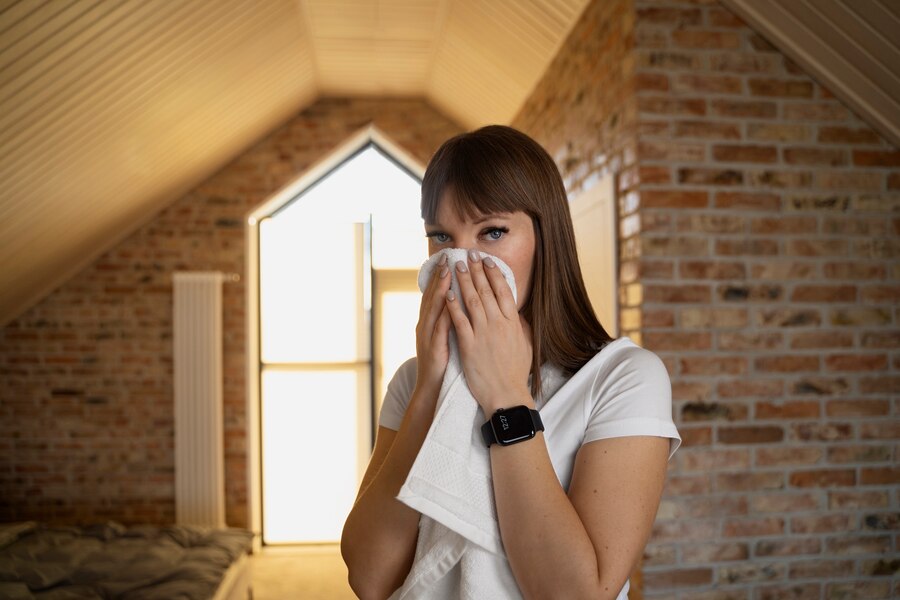Why Should You Care About Indoor Air Quality?
Did you know that the air inside your home can be up to 5 times more polluted than outdoor air? That’s true, indoor air is just as important as outdoor air, if not more. Poor indoor air can lead to allergies, asthma, and breathing problems over time. But don’t worry, improving your indoor air quality is easier than you think. In this guide, we’ll explain what IAQ is, why it matters, and how you can make your home healthier for you and your family.
What Exactly Is Indoor Air Quality (IAQ)?
Indoor air quality means how clean and safe the air is inside buildings, especially homes. Good IAQ means the air is free from harmful pollutants and safe to breathe. On the other hand, Poor indoor air quality happens when the air contains dust, mold, pet dander, or chemicals. These can come from everyday things like cleaning products, furniture, or cooking.
Key Factors That Affect Indoor Air Quality
- Ventilation : Poor airflow can trap pollutants inside.
- Humidity Levels : Too much moisture leads to mold, while too little causes dryness.
- Pollutants : Dust, smoke, and chemicals reduce air quality.
Why Does Indoor Air Quality Matter?
Good indoor air quality is essential for your health and well-being. Breathing clean air helps you stay healthy, focused, and energized. Here’s why IAQ matters:
Health Risks of Poor Indoor Air Quality
Poor IAQ can cause both short-term and long-term health problems. For example:
- Short-Term Effects : Headaches, fatigue, and irritation of the eyes, nose, or throat.
- Long-Term Effects : Chronic respiratory diseases, heart conditions, and even cancer.
Children, elderly individuals, and people with pre-existing health conditions are especially vulnerable.
How Clean Air Improves Your Daily Life
Clean air doesn’t just keep you healthy, it also boosts productivity and improves your mood. Studies show that good indoor air quality helps people focus and work better.

Protect your health and improve your indoor air quality today! Schedule a professional IAQ assessment with MXenv.com and breathe easier in a mold-free environment.
Common Indoor Air Pollutants and Their Sources
Understanding the sources of indoor air pollution is the first step to improving your IAQ. Here are some common culprits:
1. Dust Mites
- Tiny bugs that live in bedding, carpets, and upholstery.
- Can trigger allergies and asthma.
2. Mold and Mildew
- Grows in damp areas like bathrooms or basements.
- Causes respiratory issues and allergic reactions.
3. Volatile Organic Compounds (VOCs)
- Found in paints, cleaning products, and furniture.
- Can irritate the lungs and cause headaches.
4. Pet Dander
- Tiny flakes of skin shed by pets.
- A major allergen for many people.
5. Carbon Monoxide (CO)
- Produced by faulty appliances or heaters.
- Dangerous and potentially fatal in high concentrations.
How to Test and Monitor Indoor Air Quality
Testing your indoor air quality is an important step toward healthier living. Here’s how you can do it:
Best Tools to Monitor Your Indoor Air Quality
- DIY Test Kits : Affordable and easy to use.
- Smart Air Quality Monitors : Provide real-time data on pollutants like VOCs and humidity levels.
Understanding Air Quality Index (AQI) Levels
The AQI measures how clean or polluted the air is. Here’s a quick breakdown:
| AQI LEVEL | AIR QUALITY | HEALTH IMPLICATIONS |
|---|---|---|
| 0–50 | Good | No health risks |
| 51–100 | Moderate | Acceptable but may affect sensitive groups |
| 101–150 | Unhealthy for Sensitive Groups | May cause irritation or breathing issues |
| 151+ | Unhealthy | Harmful to everyone |
Practical Tips to Improve Indoor Air Quality
Improving your indoor air quality doesn’t have to be complicated. Here are some simple steps you can take:
Top Ways to Reduce Indoor Air Pollution
- Use Air Purifiers : HEPA filters are great for trapping dust and allergens.
- Improve Ventilation : Open windows regularly or upgrade your HVAC system.
- Control Humidity : Use a dehumidifier to prevent mold or a humidifier to combat dry air.
- Switch to Non-Toxic Products : Choose eco-friendly cleaning supplies and paints.
- Add Houseplants : Plants like snake plants and peace lilies naturally purify the air.
The Role of Ventilation in Cleaner Air
Proper ventilation removes stale air and brings in fresh air. If you can’t open windows often, try installing exhaust fans or using air exchange systems.
The Connection Between IAQ and Modern Lifestyles
Our modern lifestyles have a big impact on indoor air quality. For example:
- Remote Work : Spending more time at home means paying closer attention to IAQ.
- Climate Change : Rising temperatures and wildfires can worsen indoor air pollution.
Smart home tools, like air quality monitors, are becoming more popular to help people keep their indoor air clean.
FAQs About Indoor Air Quality
Here are answers to some common questions about indoor air quality:
1. How can I improve indoor air quality without spending much?
- Open windows daily, clean regularly, and add houseplants.
2. Are houseplants effective at purifying air?
Yes, certain plants like snake plants and peace lilies can help remove toxins.
3. What are the symptoms of poor indoor air quality?
Headaches, fatigue, and respiratory irritation are common signs.
4. How often should I clean my HVAC system?
At least once a year to ensure proper airflow and reduce pollutants.
Conclusion: Breathe Easier with Better Indoor Air Quality
Improving your indoor air quality is one of the best things you can do for your health and well-being. By understanding what affects indoor air and making small changes, you can make your home healthier. Start today by testing your air quality and making small changes, it’s worth it!

